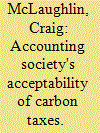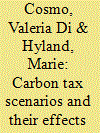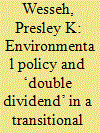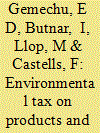|
|
|
Sort Order |
|
|
|
Items / Page
|
|
|
|
|
|
|
| Srl | Item |
| 1 |
ID:
166718


|
|
|
|
|
| Summary/Abstract |
This article seeks to examine accountants' perceptions of carbon taxes in addressing climate change. Specifically, it aims at (i) a better understanding of accountants opinions on carbon taxes; (ii) how energy companies have adapted their business operations since introducing carbon tax. The article's primary sources of data are (1) a 2018 survey distributed to 45 accounting professionals in Scotland, which specialise in energy finance and a formal interview with a regional finance director of a multinational energy company. The results show how the accountants are in favour the carbon tax due to its positive environmental impact, however, do not agree with the associated rising utility costs. Though, carbon tax, from an energy business' perspective, is viewed negatively due to its effects on the end users of energy. This study contributes to the current research by demonstrating the role of accounting society in boosting public awareness of climate change. The findings of this study will help regulators and policy makers in the UK to evaluate the adequacy of current carbon tax reforms and to promote the public awareness of climate change to reduce carbon emissions.
|
|
|
|
|
|
|
|
|
|
|
|
|
|
|
|
| 2 |
ID:
125428


|
|
|
|
|
| Publication |
2013.
|
| Summary/Abstract |
In this paper we use annual time series data from 1960 to 2008 to estimate the long run price and income elasticities underlying energy demand in Ireland. The Irish economy is divided into five sectors: residential, industrial, commercial, agricultural and transport, and separate energy demand equations are estimated for all sectors. Energy demand is broken down by fuel type, and price and income elasticities are estimated for the primary fuels in the Irish fuel mix. Using the estimated price and income elasticities we forecast Irish sectoral energy demand out to 2025. The share of electricity in the Irish fuel mix is predicted to grow over time, as the share of carbon intensive fuels such as coal, oil and peat, falls. The share of electricity in total energy demand grows most in the industrial and commercial sectors, while oil remains an important fuel in the residential and transport sectors.
Having estimated the baseline forecasts, two different carbon tax scenarios are imposed and the impact of these scenarios on energy demand, carbon dioxide emissions, and government revenue is assessed. If it is assumed that the level of the carbon tax will track the futures price of carbon under the EU-ETS, the carbon tax will rise from €21.50 per tonne CO2 in 2012 (the first year forecasted) to €41 in 2025. Results show that under this scenario total emissions would be reduced by approximately 861,000 tonnes of CO2 in 2025 relative to a zero carbon tax scenario, and that such a tax would generate €1.1 billion in revenue in the same year. We also examine a high tax scenario under which emissions reductions and revenue generated will be greater.
Finally, in order to assess the macroeconomic effects of a carbon tax, the carbon tax scenarios were run in HERMES, the ESRI's medium-term macroeconomic model. The results from HERMES show that, a carbon tax of €41 per tonne CO2 would lead to a 0.21% contraction in GDP, and a 0.08% reduction in employment. A higher carbon tax would lead to greater contractions in output.
|
|
|
|
|
|
|
|
|
|
|
|
|
|
|
|
| 3 |
ID:
169734


|
|
|
|
|
| Summary/Abstract |
Although the environmental benefit from implementing a climate tax is usually realized, the economic dividend still remains a controversial issue warranting further research. This is because the impact of an environmental policy on an economy-wide system will depend on factors that differ from one region to the next. In this paper, we develop a static CGE model for Liberia that is capable of analyzing both a uniform and a partial carbon tax policy. Under the uniform policy instituted to ensure mitigation in the range of 20–50%, an economic dividend is found for energy, employment, and welfare. In particular, energy consumption increases by between 5 and 15.5%, respectively. Interestingly, under a second best policy which exempts economically strategic sectors from the tax, no economic dividend is found for all three variables. This time, energy use declines by between 2 and 9%. These suggest that a uniform environmental tax policy is a more viable option for Liberia, in particular, as it does not only generate economic dividend for employment and welfare, it also incentivizes Liberia's adoption and use of renewable energy technologies. In general, based on the results obtained, further conditions for the feasibility of a double dividend are proposed.
|
|
|
|
|
|
|
|
|
|
|
|
|
|
|
|
| 4 |
ID:
116719


|
|
|
|
|
| Publication |
2012.
|
| Summary/Abstract |
The main aim of this work is to define an environmental tax on products based on their carbon footprint. We examine the relevance of life cycle analysis (LCA) and environmentally extended input-output analysis (EIO) as methodological tools for identifying the emission intensities on which the tax is based. The price effects of the tax and the policy implications of considering non-CO2 greenhouse gases (GHG) are also analyzed. The results from the case study on pulp production show that the environmental tax rate based on LCA (1.8%) is higher than both EIO approaches (0.8 and 1.4% for product and industry, respectively), but they are of the same order of magnitude. Although LCA is more product specific and provides a more detailed analysis, we recommend EIO as a more relevant approach to applying an economy-wide environmental tax. If an environmental tax were applied to non-CO2 GHG instead to CO2 alone, the tax would greatly affects sectors such as agriculture, mining of coal, extraction of peat, and food. Therefore, it is worthwhile for policy-makers to pay attention to the implications of considering either a CO2 tax or a global GHG emissions tax in order to make their policy measures effective and meaningful.
|
|
|
|
|
|
|
|
|
|
|
|
|
|
|
|
|
|
|
|
|